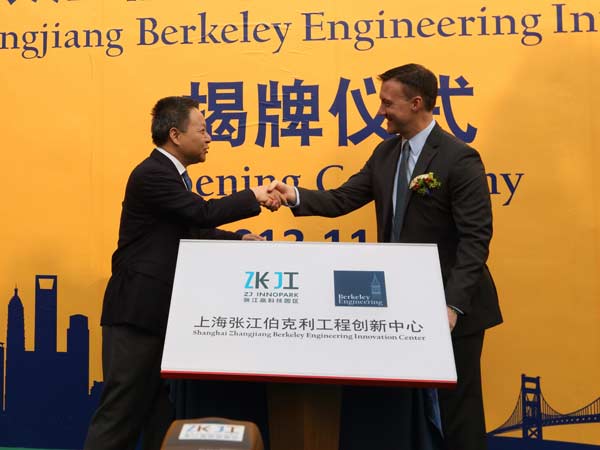Berkeley-linked research center opens in Shanghai
Updated: 2013-11-20 06:36
By Yu Wei in San Francisco (China Daily USA)
|
||||||||
 |
|
The Shanghai Zhangjiang Berkeley Engineering Innovation Center (Z-BEI) — developed by the University of California-Berkeley College of Engineering and Zhangjiang High-Tech Park, one of China’s industrial parks dedicated to tech start-ups and research — opened its doors on Friday in Shanghai. Provided to China Daily |
The Shanghai Zhangjiang Berkeley Engineering Innovation Center (Z-BEI) — developed by the University of California-Berkeley College of Engineering and Zhangjiang High-Tech Park, one of China's industrial parks dedicated to tech start-ups and research — opened its doors on Friday in Shanghai.
"Z-BEI is a platform for expanding Berkeley engineering's industrial and academic research collaborations in Asia, and for fostering global learning opportunities for Berkeley engineering students," said Connie Chang-Hasnain, Whinnery chair professor of electrical engineering and computer science.
"Berkeley's College of Engineering engages in partnerships with innovators around the world to develop new ideas, new technologies, and new products to benefit global communities," Chang-Hasnain said. "Zhangjiang High-Tech Park is one of the world's most dynamic innovation ecosystems, and we are very excited by the opportunity to deepen our engagement here."
As the college's newly appointed director of China partnerships, Chang-Hasnain said her role includes facilitating research partnerships between Berkeley and Shanghai-area industry and academic colleagues, overseeing programs in professional and executive education offered through Z-BEI, and facilitating opportunities for Berkeley engineering students to gain global experience.
"Our faculty will be collaborating with academic and industry research colleagues on a wide range of topics, beginning with areas such as information engineering, systems engineering, bioengineering, precision manufacturing, and green technology," Chang-Hasnain said.
At the same time, the team will be expanding their offerings in professional and executive education. Their recent offerings in China have included courses on innovation policy for government officials and a program called "Silicon Valley Entrepreneurship for New Chinese Entrepreneurs".
"With the opening of Z-BEI, we will be able to conduct more such programs both in Zhangjiang and at Berkeley," the director said. "Programs will range from live and teleconferenced programs in Zhangjiang to five-day certificate programs at Berkeley and in Silicon Valley."
Given the high-profile Chinese presence, Berkeley has a close academic bond with China. According to the university's website, About 1,568 Chinese students enrolled in Berkeley for 2013-14 academic year, more than one-fourth of its total 5,645 international students (not including Summer Sessions or UC Extensions), making China the largest country of origin of international graduate students at Berkeley.
Meanwhile, students at Berkeley are eager to gain experience in countries outside the US, and many of them are especially interested in China, Chang-Hasnain said. "In China, companies have found Berkeley engineering students to be invaluable short-term additions to their company, often offering them full-time positions upon graduation," she said.
As China's global influence increases, prestigious American universities are eager to deepen their engagement in the booming Chinese market in recent years. New York University has established its NYU Shanghai campus, Stanford University opened a research and education center at Peking University, Columbia University has a center in Beijing, while Johns Hopkins University has one in Nanjing, and Duke University is expected to open a degree-granting campus in Kunshan, Jiangsu province next year.
The new Z-BEI center is not only expected to allow Chinese educators and students to get more opportunities for close collaboration with Berkeley researchers and scholars, but also to enable Berkeley students to interact with Chinese businesses and colleagues based in China.
"Internships and other experiential learning opportunities offered through Z-BEI will expose our students to a broad set of technology and global marketplace challenges beyond the realm of Silicon Valley," she said.
yuwei12@chinadailyusa.com
Most Viewed
Editor's Picks

|

|

|

|

|

|
Today's Top News
Nine detained over pipeline blast
EU demands protection against US surveillance
Li looks to closer relations
China readies moon rover mission
Confucius' lessons still relevant: Xi
Economist calls for market-driven urbanization
One step closer for US accecpt TCM
TMT attracting more investors, PwC says
US Weekly

|

|














